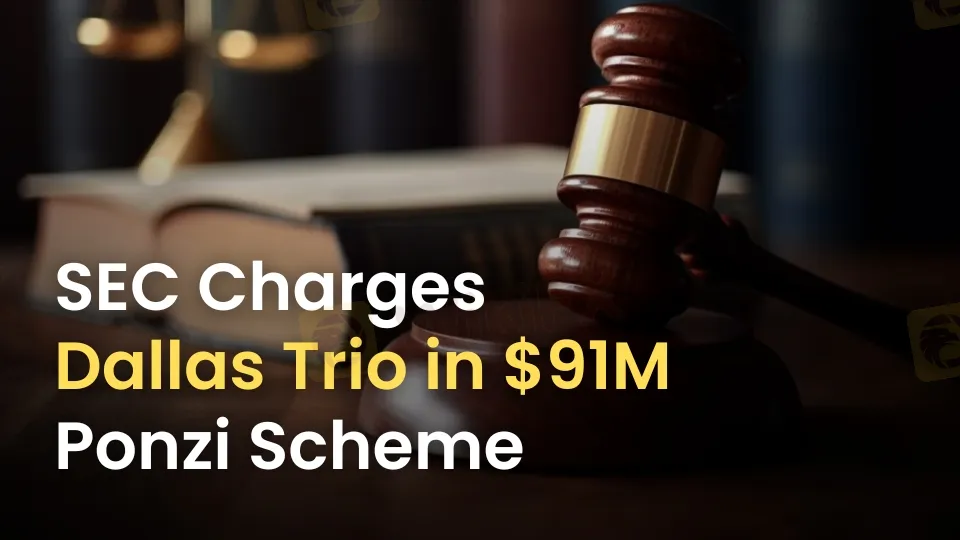简体中文
繁體中文
English
Pусский
日本語
ภาษาไทย
Tiếng Việt
Bahasa Indonesia
Español
हिन्दी
Filippiiniläinen
Français
Deutsch
Português
Türkçe
한국어
العربية
SEC Charges Dallas Trio in $91M Ponzi Scheme Defrauding Investors
Abstract:The SEC charges Kenneth W. Alexander, Robert D. Welsh, and Caedrynn E. Conner for running a $91M Ponzi scheme, promising false returns and misappropriating funds.

The U.S. Securities and Exchange Commission (SEC) has charged three Dallas-Fort Worth residents—Kenneth W. Alexander II, Robert D. Welsh, and Caedrynn E. Conner—with running a massive Ponzi scheme that swindled over 200 investors out of at least $91 million. The fraudulent operation, spanning May 2021 to February 2024, promised lucrative returns but delivered devastating losses.
The SEC alleges that Alexander and Welsh masterminded the scam through the Vanguard Holdings Group Irrevocable Trust (VHG), a supposed powerhouse in international bond trading. They lured investors with “guaranteed monthly returns of between 3% and 6%” and assurances that principal investments would be repaid after 14 months. However, the SEC claims VHG was a sham with no real revenue, propped up by Ponzi-style payments using new investors money.
Caedrynn E. Conner played a key role by funneling over $46 million into VHG through his own entity, the Benchmark Capital Holdings Irrevocable Trust. Together, the trio peddled a fake financial product called a “pay order,” marketed as a safeguard against losses, but the SEC says it was worthless. Instead of generating profits, Alexander and Conner allegedly siphoned off millions for personal gain, including Conners lavish $5 million home purchase.
Sam Waldon, Acting Director of the SEC‘s Division of Enforcement, condemned the scheme: “As we allege, the defendants conducted a large-scale Ponzi scheme that caused devastating losses to investor victims, while Alexander and Conner misappropriated millions of dollars of investor funds.” He reaffirmed the SEC’s resolve to pursue justice for defrauded investors.
Filed in the U.S. District Court for the Eastern District of Texas, the SEC‘s complaint accuses the trio of violating federal securities laws’ antifraud and registration rules. The agency is pushing for permanent injunctions, repayment of illicit profits with interest, and hefty civil penalties to hold them accountable.
This case underscores the dangers of Ponzi schemes masquerading as legitimate investments. Investors were drawn in by bold promises of steady returns and security, only to see their savings vanish. The SECs action serves as a stark reminder to scrutinize too-good-to-be-true opportunities in the financial world.

Disclaimer:
The views in this article only represent the author's personal views, and do not constitute investment advice on this platform. This platform does not guarantee the accuracy, completeness and timeliness of the information in the article, and will not be liable for any loss caused by the use of or reliance on the information in the article.
Read more

Using Any of These Illegal Forex Trading Apps? Stop Before It Turns into a Crisis
The Reserve Bank of India (RBI) has listed out some illegal forex apps India. Read this article to know some of those apps.

5 Reasons to Stay Away from Core Prime Markets
The Forex market is a very unpredictable, complex, and risky place. There are many brokers that appear genuine but can steal your hard-earned money. So, staying alert is the only way to survive in this dynamic environment. Therefore, in this article, we are sharing 5 warning signs about Core Prime Markets.

Think Before You Trade! Unlicensed Brokers List Inside
The French regulator AMF has issued a warning against five unlicensed brokers. Investors are encouraged to verify the list to protect themselves from fraud.

Citibank Sued in $20M Romance Scam Tied to Fraudulent Transfers
Citibank faces a lawsuit over a $20M romance scam. Plaintiff alleges the bank enabled fraud by failing to block suspicious transfers.
WikiFX Broker
Latest News
PU Prime and AFA Announce Partnership at Madrid Event
ASIC Warns of Escalating Share Sale Scams Amid $119M Scam Losses
A Guide to RBI Forex Rules in India
“Wins with $19,916 weekly profit on Exnova”? There is something you should know.
Oil Prices Slide After Cease-Fire
IQ Option: Regulation, Warnings, and What Traders Need to Know
How Macro Events Drive Energy Price Fluctuations and Their Linked Impact on the Global Forex Market
Clones of ThinkMarkets Are Lurking | Don’t Fall for the Fake
Top 5 Forex Brokers Offering Islamic Accounts in 2025
Family offices double down on private credit and infrastructure during private equity slump, survey finds
Currency Calculator


